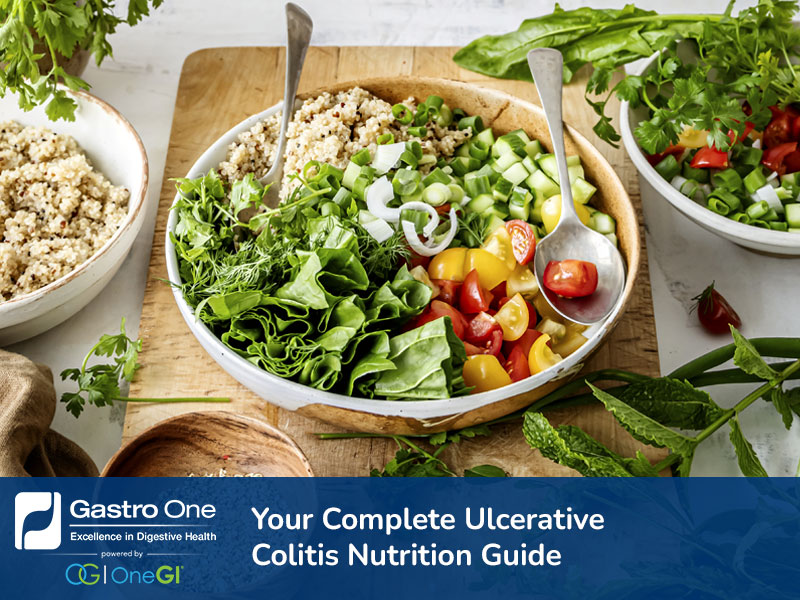
Living with ulcerative colitis means learning how food affects your body. This guide explains which foods support your health and which ones to limit. You’ll find practical strategies to manage symptoms through nutrition.
Ulcerative colitis affects over 1.9 million Americans. This chronic inflammatory bowel disease creates ulcers in your colon’s inner lining. Food choices directly impact inflammation levels and symptom severity.
Table of Contents
Understanding Ulcerative Colitis and Your Diet
Ulcerative colitis is a inflammatory bowel disease (IBD). Unlike Crohn’s disease, which affects the entire digestive tract, ulcerative colitis targets only your large intestine and rectum.
The condition causes continuous inflammation from your rectum upward through your colon. This inflammation creates open sores called ulcers. Your symptoms depend on how much of your colon is affected and the inflammation’s severity.
Ulcerative Colitis common symptoms include bloody stool, urgent bowel movements, abdominal cramping, and diarrhea. These symptoms arrive in waves with periods of remission between flares.
Nutrition is essential in managing ulcerative colitis, as the right foods can reduce inflammation and aid healing, while poor choices can worsen symptoms. Combining a proper diet with the best treatment for ulcerative colitis can help effectively manage the condition and support overall well-being.
Recommended Foods for Ulcerative Colitis Diet
A well-planned ulcerative colitis diet can help manage symptoms and improve overall gut health. Below are some recommended foods that may play a beneficial role during remission or flare-ups.
Easy-to-Digest Proteins
Focus on lean proteins that won’t irritate your digestive system:
- Fish and seafood
- Poultry without skin
- Eggs
- Firm tofu
Foods Rich in Omega-3 Fatty Acids
Omega-3 fatty acids have anti-inflammatory properties that may help reduce symptoms and support gut health during ulcerative colitis. Include the following omega-3-rich foods in your diet:
- Fatty fish (e.g., salmon, tuna, mackerel)
- Walnut butter
- Chia seeds
- Flaxseed oil
- Flaxseed meal
Avoid red meat and processed meats. Studies link these foods to increased inflammation in people with IBD.
Low-Fiber Fruits
Choose fruits that are gentle on your digestive system:
- Bananas
- Cantaloupe
- Applesauce
- Cooked or blended fruits
Refined Grains and Starches
During flares, refined grains are easier to digest than whole grains:
- White rice
- Potatoes and sweet potatoes
- White pasta
- Oatmeal
- Gluten-free bread
Cooked Vegetables
Raw vegetables can trigger symptoms. Try these cooked options:
- Squash and zucchini
- Carrots (cooked until fork-tender)
- Green beans
- Cucumber without skin
- Asparagus tips
Probiotic Foods
Good bacteria support digestive health. Include:
- Plain yogurt with live cultures
- Kefir
- Miso soup
Hydrating Foods and Beverages
Stay hydrated to prevent dehydration from diarrhea:
- Water
- Bone broth
- Herbal teas
- Smoothies
- Oral rehydration solutions
Foods to Avoid with Ulcerative Colitis
High-Fiber Foods During Flares
Insoluble fiber can worsen symptoms during active disease:
- Raw vegetables like broccoli and kale
- Whole nuts and seeds
- Fruits with skin
- Whole grains
- Popcorn
Dairy Products
Many people with ulcerative colitis develop lactose intolerance:
- Milk
- Ice cream
- Cheese
- Cream
Trigger Foods
These foods commonly cause symptoms:
- Spicy foods
- High-fat foods
- Alcohol
- Caffeinated beverages
- Carbonated drinks
- Sugar alcohols (sorbitol, xylitol)
Processed Foods
Limit foods with artificial additives:
- Foods containing carboxymethylcellulose
- Products with polysorbate-80
- Items with artificial sweeteners
High-Sugar Foods
Excess sugar can worsen inflammation:
- Candy
- Pastries
- Sugary drinks
- Processed desserts
Meal Planning and Preparation Tips
Creating balanced meals can help manage symptoms and promote overall well-being. Focus on incorporating whole, unprocessed foods that are gentle on the digestive system.
Tips for Managing Diet
- Food Journal: Track what you eat, portion sizes, symptoms, and timing to identify triggers.
- Balanced Meals: Focus on protein, easily digestible carbs, healthy fats, and cooked vegetables.
- Adapt to Disease Phases: Stock easy-to-digest foods for flares, whole foods for remission, and quick meals for low-energy days.
- Gentle Cooking: Steam veggies, bake proteins, cook grains thoroughly, and blend fruits/veggies.
The Importance of Individualized Nutrition Plans
No single diet works for everyone with ulcerative colitis. Your nutritional needs depend on:
- Disease severity and location
- Current symptoms
- Personal food tolerances
- Nutritional status
- Other health conditions
Some people benefit from specific diets like the low-FODMAP approach. Others do well with Mediterranean-style eating patterns. The key is finding what works for your body.
Consulting Healthcare Professionals
Working with specialists ensures proper nutrition while managing your condition.
Gastroenterologist Role
Gastroenterologists monitor disease activity, adjust treatments, and ensure dietary changes don’t interfere with medications.
Registered Dietitian Benefits
IBD-focused dietitians help identify trigger foods, plan meals during flares, prevent deficiencies, and develop long-term strategies.
Regular Monitoring
Regular check-ups track nutrition, monitor vitamin levels, adjust diets, and address symptoms.
Taking Control of Your Health Through Nutrition
Managing ulcerative colitis requires patience, planning, and a comprehensive approach. Use a food journal to track triggers, focus on anti-inflammatory foods, and work with your healthcare team to combine diet, medication, and lifestyle changes. Don’t rely on diet alone. Schedule an appointment with a Gastro One specialist to create an effective treatment plan and improve your quality of life.



